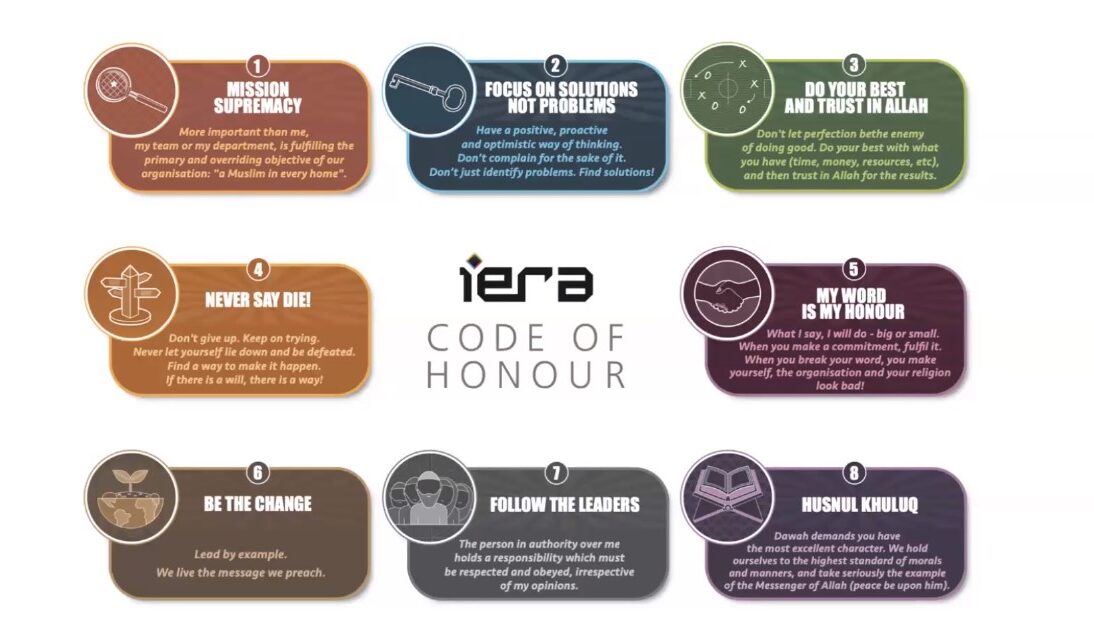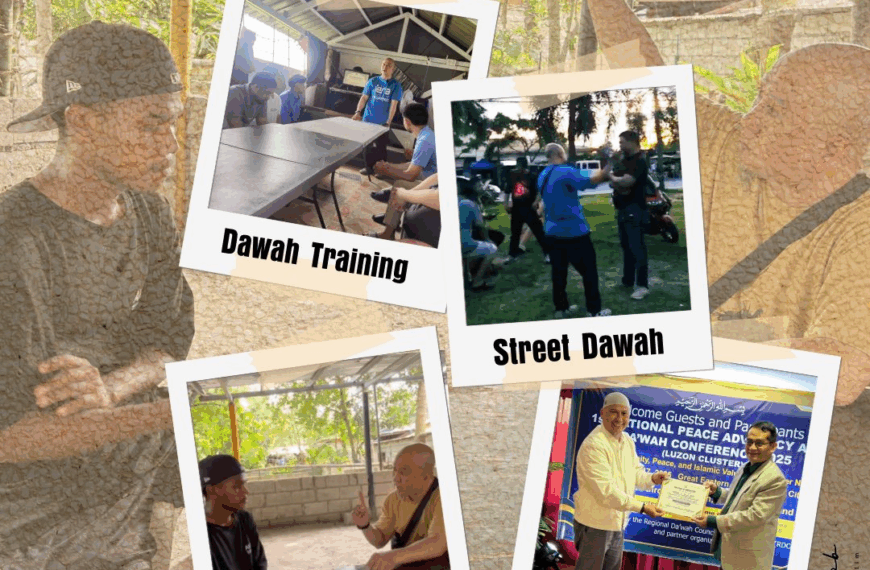At iERA, our Code of Honour –is a set of principles that delineate our values and guide our collective journey. Inspired by the profound teachings of Islam, the Code is not merely a document but a way of life, steering us towards efficient teamwork and the global dissemination of Islam’s beautiful message.
Anyone assuming a role at iERA must not only undergoes our comprehensive iERA Dawah Training course, accessible online, but also embrace a profound understanding of the GORAP method. This method serves as a key tool for conveying the message of Islam to non-Muslims. GORAP is designed to distill the core beliefs of Islam, emphasizing the belief in God as the Most Wise and the One who sent the message of Islam. It is, essentially, a rationale for why Islam is true.
Many successful organizations have a code that defines their values and principles. Ours, the Code of Honour, outlines the rules and values that govern us as a team. Rooted in the teachings of Islam, this code allows us to work efficiently and harmoniously, spreading the beautiful message of Islam to the world.
In challenging times, emotions can cloud judgment. Our Code of Honour acts as a compass, ensuring rational decision-making and effective communication. By adhering to this code, even in high-pressure situations, we can maintain focus and unity, ultimately leading to better outcomes for our organization and the communities we serve.
The Code of Honour isn’t just a document; it’s a way of life at iERA. We encourage every team member to hold themselves and others accountable to this code. Constructive feedback is essential. If you see a deviation from our principles:
- Choose an Appropriate Time: Approach the conversation with respect and sensitivity.
- Acknowledge Your Feelings: Be aware of your emotions and address them before discussing the issue.
- Ask Permission: Respect the other person’s space and ask if you can discuss the Code of Honour.
- Focus on Behavior: Address specific actions, not the person, reminding them of our shared code.
- Offer Support: Help them understand the right way and offer assistance in aligning with our values.
- Listen Actively: When called out, listen attentively, and learn from the experience.
- Make Amends: If you made a mistake, admit it, and work towards making it right for the team.
- Pick the appropriate time to call it. Don’t humiliate anyone, and take a break if you’re feeling emotional.
- If you’re uncomfortable, then acknowledge those feelings first.
- Ask permission to call it, e.g. If it is ok with you, I would like to discuss the code of honour with you, do you have some time?
- Correct the behaviour not the person. De-personalise it. Separate the person from the behavior. Remember it isn’t you correcting them, it is the code.
- State specifically what didn’t work and offer support.
- Ensure the benefits for correcting the behaviour are clear for the individual. Most people want to be the best they can be, they just need to be reminded.
- Remind them of the rules we have all agreed to.
- Allow the person to respond, hear them out without rebuttal and thank them for their time and for listening.
- Acknowledge the behaviour you want. Down the line when they do what you’ve asked, thank them and acknowledge it
- Take a deep breath. This will ensure clarity of thought. Don’t let emotion go up and breathing go down.
- Understand that for the person calling you, for them it seems absolutely true and important to them personally. Also that it takes courage to openly discuss this with you.
- Listen actively. Don’t listen and build your defence. Listen only.
- If you made a mistake, admit it. Once you admit it, it’s done.
- Ask the person how you can make it right and make a mend for the team.
- If the call being made isn’t accurate then go back to the rule in the code of honour and clearly define what it means.
- Become truly interested and inquisitive in the call. If you really want iERA and the team to succeed then we have to ensure our own behaviour is in line with the code
The code defines who we are as an organisation. If we don’t live the code as individuals it is unlikely that we will reach our full potential as a team or organisation.This is nothing to do with work output but rather it is how we think and conduct ourselves as teams and as an organisation.Consistently breaking the code will ultimately lead to the realisation that this person possibly doesn’t belong to the iERA team.
Those that follow the code will be the ones that make an outstanding contribution to the team and organization. Their performance will create the environment and results required to achieve the ultimate vision of iERA. Living the code will result in being a true part of the organization.
At iERA, our unwavering commitment to spreading the message of Islam is grounded in Mission Supremacy. We believe in direct interactions, Level 1 Dawah, as the pivotal approach to bringing people to Islam and ensuring they stay upon this beautiful path. As a part of iERA’s team, adhering to the Code of Conduct is essential in fulfilling this mission with excellence.
Mission supremacy means that the mission of iERA (our overall objective to bring the message of Islam to humanity) will be fulfilled in light of the saying of the Prophet Muhammad (PBUH) that ‘there will not be a home, even if it is made of mud or hair, except that Islam will enter it (there will be a Muslim inside that home)’. We are the people or tools who want to make this a reality. It is our overriding mission.
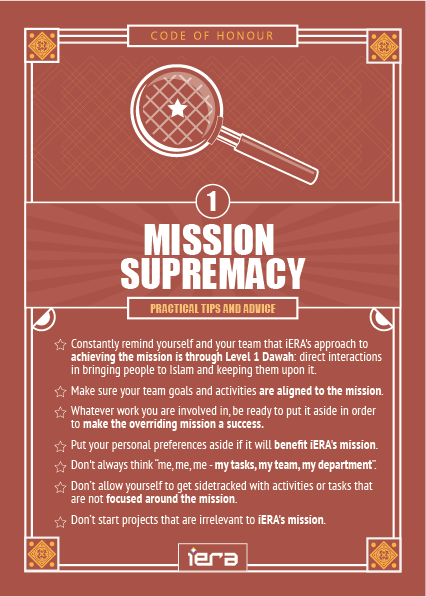
The mission is the North Star of iERA. It’s the guiding principle that inspires every action. Regularly remind yourself and your team members about this overarching goal. This shared understanding keeps everyone aligned and motivated to work towards a common purpose.
Align Your Team Goals and Activities
Ensure that the objectives of your team are in harmony with iERA’s mission. Each team should have a clear link to the organization’s ultimate goal. Review your team’s goals periodically and make adjustments to ensure alignment. When every department contributes cohesively, iERA’s impact is amplified.
Be Ready to Prioritize the Mission
In the pursuit of mission supremacy, you must be prepared to put other tasks aside if they hinder the success of iERA’s mission. This may require making tough decisions, but it underscores your commitment to the organization’s higher purpose.
Put Personal Preferences Aside
The mission should always take precedence over personal preferences. Sometimes, the most effective course of action might not be your first choice. Be willing to put your personal inclinations aside if it benefits iERA’s mission and contributes to its success.
Avoid Self-Centered Thinking
One of the most significant challenges in any organization is combating self-centered thinking. Don’t limit your perspective to “me, me, me” – focusing only on your tasks, your team, or your department. Embrace a collective mindset that values the mission above individual interests.
Stay Focused, Avoid Distractions
In the pursuit of mission supremacy, distractions can be detrimental. Don’t allow yourself or your team to get sidetracked with activities or tasks that are not directly related to iERA’s mission. Stay focused on what truly matters, and you’ll maximize your impact.
Prioritize Relevant Projects
Avoid starting projects that are irrelevant to iERA’s mission. Before embarking on a new endeavor, assess its alignment with the organization’s goals. Only pursue projects that directly contribute to the advancement of iERA’s mission.
At iERA, Mission Supremacy isn’t just a concept; it’s our way of life. By embodying these principles, we ensure that every action we take, every project we initiate, and every interaction we have resonates with the mission. Together, as a united team, we can make a lasting impact and share the beauty of Islam with the world.
Let Mission Supremacy guide our every step, for in its pursuit, we find the essence of our purpose at iERA.
In the dynamic environment of iERA (Islamic Education and Research Academy), the ability to focus on solutions, not problems, stands as a cornerstone of our operational philosophy. Embracing challenges as opportunities for growth, we foster a proactive approach aimed at continuous improvement.
The Prophet Muhammed (PBUH) warned us about saying ‘if’ (if only this or that had happened then things would be different). We must be pleased with Allah’s decree, and know that this ‘if’ opens the door for shaytaan. This doesn’t mean we can’t look back at situations, and plan on how we can improve things for the future. Analyzing errors gives insight into improve for the future.
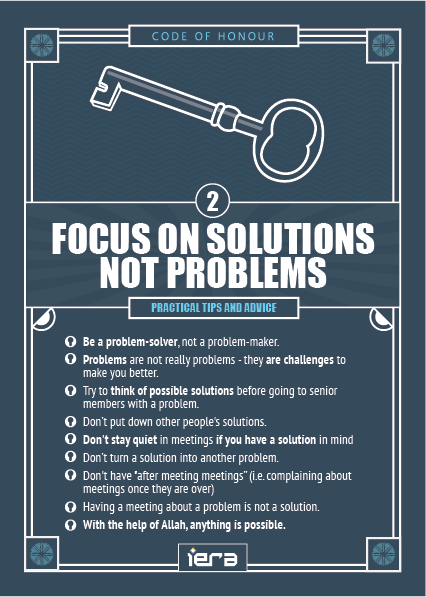
Be a Problem-Solver, Not a Problem-Maker
At iERA, we thrive on challenges, viewing them as opportunities for growth. Instead of dwelling on problems, focus on being a proactive problem-solver within the team. Embrace challenges as a chance to enhance your skills and contribute positively to our mission.
Think of Solutions First
Challenge yourself to brainstorm potential solutions. Cultivate a mindset of creativity and innovation, striving to find answers independently. By presenting solutions alongside challenges, you showcase your problem-solving skills and demonstrate your commitment to overcoming obstacles.
Respect Others’ Solutions
Every team member’s input is valuable. Avoid putting down other people’s solutions; instead, appreciate the diversity of ideas within our team. Acknowledge the efforts of your colleagues, fostering an environment of mutual respect and collaboration.
Speak Up in Meetings
Your voice matters. If you have a solution in mind, don’t hesitate to share it in meetings. Effective communication is the cornerstone of teamwork. By actively participating and offering solutions, you contribute significantly to our collective success.
Avoid Turning Solutions into Problems
Once a solution is identified, refrain from turning it into another problem. Implement it thoughtfully, considering its impact on the team and the mission. Avoid unnecessary complications, ensuring that solutions lead to positive outcomes.
Eliminate “After Meeting Meetings”
Constructive feedback is crucial, but complaining about meetings after they conclude doesn’t contribute to solutions. Instead, focus on proactive communication during meetings, addressing concerns directly. By fostering an open dialogue, we can collectively find solutions and enhance our collaborative efforts.
Meetings Are Not Solutions
While meetings facilitate communication, they are not solutions in themselves. Engage in active problem-solving discussions during meetings, but recognize that real solutions require action beyond the meeting room. Take initiative, collaborate with your team, and implement agreed-upon strategies to drive positive change.
With the Help of Allah, Anything Is Possible
Above all, trust in the divine guidance of Allah. With unwavering faith and determination, we can overcome any challenge. Believe in your abilities, rely on Allah’s wisdom, and approach problems with confidence, knowing that solutions are within reach.
By focusing on solutions, embracing challenges, and working together with dedication and faith, we can overcome obstacles and continue advancing iERA’s mission. Together, as problem-solvers, we can achieve remarkable outcomes and make a lasting impact in spreading the message of Islam to the world.
Incorporating these principles into your work at iERA will not only help you become a more effective problem-solver but also contribute to the organization’s broader mission of spreading the message of Islam to the world.
Your commitment to focusing on solutions can make a significant difference in the achievement of iERA’s goals.
One of the things that defines iERA as an organisation is the high quality of our work. The dawah deserves the best. When iERA was launched back in 2009, there was a lack of appropriate dawah. Materials generally in the dawah field, but we stepped up and produced our own high quality publications.
We used ‘Ihsan’, which was defined by the Prophet Muhammed (PBUH) as ‘Worshipping Allah is if you are seeing Him (although you cannot see Him, you know that He is seeing you)’. If you lived all the time with the mental awareness that Allah is seeing you, you would certainly make sure you do everything in the best possible manner.
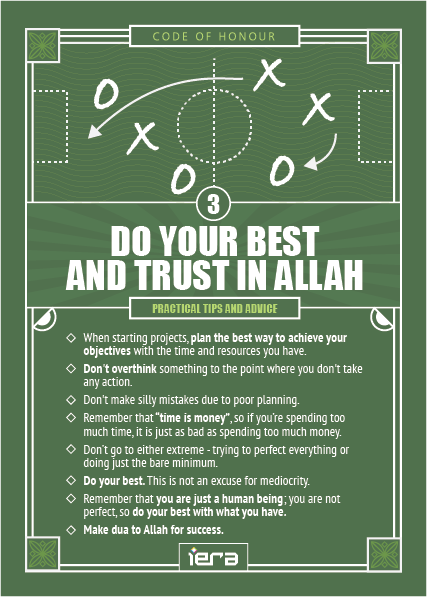
his core principle is not just a part of the organization’s Code of Conduct; it’s a way of life. Here are practical insights derived from iERA’s ethos on how to infuse your efforts with sincerity and trust in Allah:
Plan Efficiently
When initiating projects, invest time in thoughtful planning. Strive to achieve your objectives within the given time and resources. A well-thought-out plan is like a compass, guiding your journey towards success.
Take Action
Avoid the trap of overthinking that leads to stagnation. While planning is essential, it should propel you into action. Trust your preparations and take confident steps forward. Action, even imperfect, is the key to progress.
Avoid Silly Mistakes
Meticulous preparation minimizes avoidable mistakes. Attention to detail and careful consideration can prevent errors, ensuring a smoother workflow.
Value Time
Time is a precious resource. Remember the value of every moment. If you find yourself spending excessive time on a task, assess your approach. Balance thoroughness with efficiency, making the most of your time.
Strive for Excellence
Striking a balance between perfectionism and mediocrity is crucial. Aim for excellence in all endeavors. Your dedication to high standards reflects your commitment to iERA’s mission.
Acknowledge Your Humanity
Recognize your human limitations. Embrace imperfections while striving to overcome them. Your humanity underscores the need for continuous improvement. It doesn’t excuse mediocrity but emphasizes the importance of growth.
Make Dua for Success
Incorporate spirituality into your efforts. Turn to Allah through prayer (dua) for guidance and success. Trust that your sincerity and hard work, combined with divine blessings, pave the way for remarkable achievements.
Embracing these principles fosters an environment of excellence and reliance on Allah. By doing your best and trusting in Allah, you not only fulfill your responsibilities but also contribute profoundly to iERA’s mission. Trust in Allah’s wisdom, believe in your capabilities, and continue to strive for excellence in all your undertakings.
With sincerity and divine guidance, your journey with iERA becomes not just a mission but a profound and transformative experience.
In the face of challenges, setbacks, and seemingly insurmountable obstacles, the spirit of ‘Never Say Die’ becomes the driving force that propels individuals and organizations to unprecedented heights. At iERA (Islamic Education and Research Academy), we not only acknowledge adversity but also embrace it as a test of our resolve and faith. In this post, we explore practical tips and profound advice inspired by the unwavering spirit of ‘Never Say Die.’
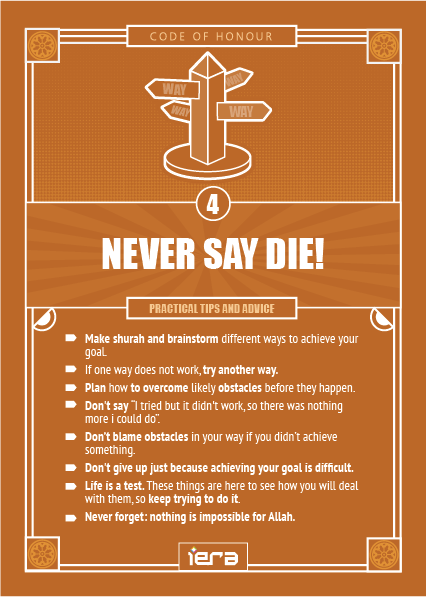
Engage in Shurah and Brainstorming
In the pursuit of your goals, wisdom often lies in collaboration. Engage in shurah, consult with others, and brainstorm various approaches. Fresh perspectives can illuminate new pathways and solutions, invigorating your efforts with creativity and innovation.
Persist in Exploring Alternatives
If one avenue proves unfruitful, do not be disheartened. Persistence is the key. Try another approach, explore diverse methods, and remain open to adapting your strategies. Remember, resilience is often rewarded with unexpected breakthroughs.
Anticipate and Overcome Obstacles
Foresee potential challenges and devise plans to surmount them proactively. Preparation is a potent tool against adversity. By anticipating obstacles, you empower yourself to face them with confidence and determination.
Avoid Blame; Embrace Responsibility
Taking responsibility is the cornerstone of resilience. Do not succumb to blame or make excuses when faced with setbacks. Instead, reflect on your actions, learn from your experiences, and use them as stepping stones toward growth.
Embrace Life’s Trials as Tests
Life, with all its challenges, is a divine test of our character and faith. Approach difficulties with the understanding that they are opportunities for growth. Embrace these trials as tests that shape your resilience and fortitude.
Remember: Nothing Is Impossible for Allah
Amidst the trials and tribulations, remember the limitless power of Allah. With faith and reliance on Him, even the most daunting obstacles can be overcome. Trust in His wisdom and guidance, and you will find the strength to persevere.
By following these practical tips and embracing the spirit of unwavering determination, we not only fulfill our responsibilities but also contribute significantly to iERA’s noble mission. Challenges should be seen as opportunities, tests of our faith, and stepping stones to success. As we face adversity, let us remember that nothing is impossible for Allah.
Remember, with Allah by your side, nothing is beyond your reach.
The strength of one’s character is often measured by the integrity of their words. At iERA (Islamic Education and Research Academy), we hold a fundamental truth close to our hearts: when you say something, it is not merely a collection of words; it becomes a binding contract, a sacred trust—an ‘Amanah.’ Your word, your promise, and your commitment are not just casual utterances; they are your bond, your contract, your trust. When you say you will do something, it transcends verbal affirmation; it becomes your word of honor.
In Islam, ‘Amanah’ signifies a sacred trust—a commitment that must be honored with the utmost sincerity and diligence. When you make a promise, it becomes your ‘Amanah,’ a binding agreement that demands fulfillment. Your ability to uphold this trust is a testament to your integrity and the depth of your character.

In this post, we delve into the essence of ‘My Word is My Honour’ and explore practical tips and invaluable advice on how to uphold your integrity in both personal and professional spheres.
Complete Tasks with Punctuality
Punctuality is a mark of respect for your own time and that of others. Complete your tasks diligently, ensuring they are accomplished well before their deadlines. Procrastination only erodes the trust others place in you; therefore, act promptly and efficiently.
Prioritize Agreements: A Commitment to Excellence
When planning your week, prioritize your agreements. Whether they are professional commitments or personal promises, each one deserves careful attention. By organizing your tasks and agreements, you not only manage your time effectively but also demonstrate your dedication to honoring your commitments.
Cautious Commitments: The Power of Saying No
Before making agreements, exercise caution. It is better to decline a commitment than to make a promise and subsequently let someone down. Assess your capabilities and availability before agreeing to any task. Saying no, when necessary, preserves your integrity and prevents unintended disappointments.
Time-Bound Agreements: Check Your Schedule
Before agreeing to time-bound commitments, check your diaries and schedules. Ensuring that you have the necessary time and resources available prevents overcommitment and guarantees your ability to fulfill your promises promptly.
Timely Responses: Professional Courtesy
Attend agreed meetings punctually and respond to your colleagues’ emails and texts in a timely manner. Professional courtesy and respect for others’ time reinforce the trust placed in your reliability and responsiveness.
Apologize and Learn: Embracing Responsibility
If, for any reason, you fail to fulfill an agreement, do not make excuses. Instead, offer a sincere apology. Reflect on the reasons behind the failure and devise strategies to ensure it does not recur. Embracing responsibility for your actions builds trust and strengthens your integrity.
At iERA, we uphold this principle with unwavering dedication. Let it be a guiding light in your personal and professional endeavors. By honoring your word, you not only earn the respect of others but also nurture a reputation for trustworthiness and dependability.
Uphold your commitments with sincerity, embrace your responsibilities, and watch as your integrity becomes a beacon of light.
At iERA (Islamic Education and Research Academy), we firmly believe in the power of personal example—a commitment to lead by doing. At iERA, we firmly believe in the power of personal example—a commitment to lead by doing. In this post, we explore the essence of ‘Be the Change,’ offering practical tips and invaluable advice to inspire proactive transformation in your personal and spiritual journey.
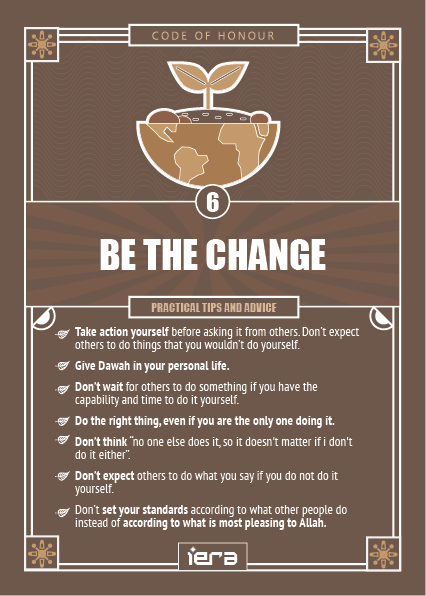
Lead by Example: Take Initiative
Take action yourself before expecting it from others. Demonstrating initiative sets a precedent for proactive engagement. Don’t delegate tasks that you wouldn’t be willing to do yourself. Your actions speak volumes about your commitment to the cause.
Dawah in Daily Life: A Living Example
Embrace the practice of giving Dawah in your personal life. Your actions, kindness, and integrity can be powerful avenues for conveying the message of Islam. By living your values, you inspire others and contribute positively to the perception of your faith.
Empowerment through Action: Do It Yourself
If you have the capability and time to make a difference, don’t wait for others to initiate change. Empowerment comes through action. Seize the opportunity to make a positive impact, even if it means taking the first step alone.
Uphold Righteousness: Regardless of Others
Do the right thing, even if you find yourself standing alone. Your integrity is not determined by the actions of others. Upholding righteousness, even in solitude, is a testament to your character and commitment to your beliefs.
Setting Ethical Standards: Pleasing Allah Above All
Avoid the trap of conforming to the standards set by others. Instead, set your ethical benchmarks based on what is most pleasing to Allah. Your moral compass should be guided by divine principles, not societal norms.
Lead with Integrity: Practice What You Preach
Don’t expect others to follow your guidance if you do not embody it in your own actions. Lead with integrity, ensuring that your words and deeds align harmoniously. Authenticity strengthens your influence and credibility.
In a world filled with challenges, ‘Be the Change’ emerges as a powerful guiding principle. At iERA, we have witnessed the transformational impact of leading by example. As you embark on this journey of personal and spiritual growth, remember that your actions have the potential to reshape lives and communities.
‘Be the Change,’ you not only inspire others but also contribute significantly to a better, more harmonious world.
“Follow the Leaders” embodies the principle of unified action, acknowledging the authority of those in positions of responsibility. At iERA (Islamic Education and Research Academy), we understand the importance of cohesive teamwork and mutual respect. leadership is the linchpin that steers the course of progress and unity.
Following the guidance and respecting the authority of leaders play pivotal roles. “Follow the Leaders” at iERA (Islamic Education and Research Academy) signifies not just obedience, but also an acknowledgment of the collective strength that comes from unity. In this post, we explore the essence of this principle, offering practical tips and invaluable advice on how to foster a respectful and collaborative working environment with leaders at the helm.
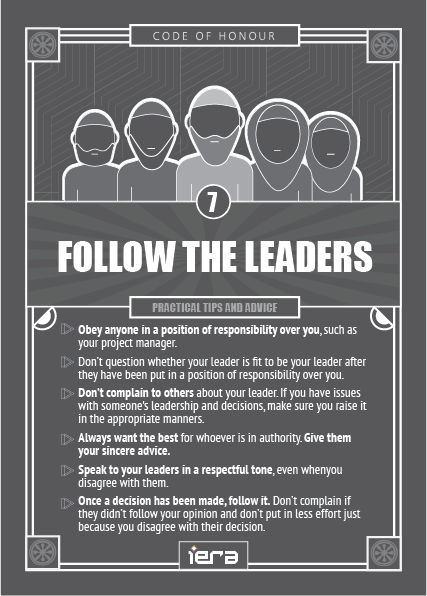
Respect for Authority: A Foundation of Unity
Obeying those in positions of responsibility is not just a duty; it’s the cornerstone of unity and organizational strength. Upholding this respect ensures a harmonious working environment and paves the way for efficient decision-making processes.
Trust in Leadership: A Catalyst for Growth
Once a leader has been appointed, it is essential to trust their capability and judgment. Avoid questioning their suitability after they have assumed their role. Trust in the wisdom of the decision-makers and focus on supporting their initiatives for the collective benefit of the organization.
Constructive Communication: Raising Concerns Respectfully
While disagreements might arise, it is crucial to address them constructively. Instead of complaining to others, approach your leaders directly and express your concerns respectfully. Constructive feedback, given in an appropriate manner, strengthens the decision-making process and fosters an atmosphere of openness.
Sincere Advice: Wanting the Best for Authority
Offering sincere advice to those in authority demonstrates your commitment to their success and the organization’s overall well-being. Your genuine insights, shared with respect, can provide valuable perspectives and contribute to informed decisions.
Respectful Dialogue: Tone and Disagreement
When engaging with leaders, maintain a respectful tone, even in moments of disagreement. Respectful dialogue fosters a culture of open communication and encourages healthy debates that can lead to well-informed choices.
Unity in Action: Following Decisions
Once decisions have been made, it is imperative to support and implement them wholeheartedly. Avoid diminishing your efforts or complaining simply because the decision didn’t align with your opinion. Unity in action propels the organization forward, even when perspectives differ.
“Follow the Leaders” encapsulates not just obedience but a deeper sense of respect, trust, and unity within an organization. At iERA, we recognize the power of cohesive teamwork and unwavering respect for leadership. By upholding these principles, we cultivate an environment where decisions are respected, disagreements are addressed constructively, and collective efforts drive the organization toward its goals.
Let ‘Follow the Leaders’ guide your interactions, allowing you to contribute positively to collective endeavors
At iERA (Islamic Education and Research Academy), the guiding principle of ‘Husnul Khuluq’ (excellence in character) illuminates our path toward meaningful relationships, respect, and compassion. This code of conduct reflects not only our actions but also our intentions, reminding us to mirror the exemplary behavior of the Prophet Muhammad (PBUH). At iERA , we hold the principle of ‘Husnul Khuluq’ in high esteem, which emphasizes the cultivation of noble character in our daily lives.
In this blog post, we explore practical tips and invaluable advice on how to embark on a journey toward Husnul Khuluq in your personal and professional life.
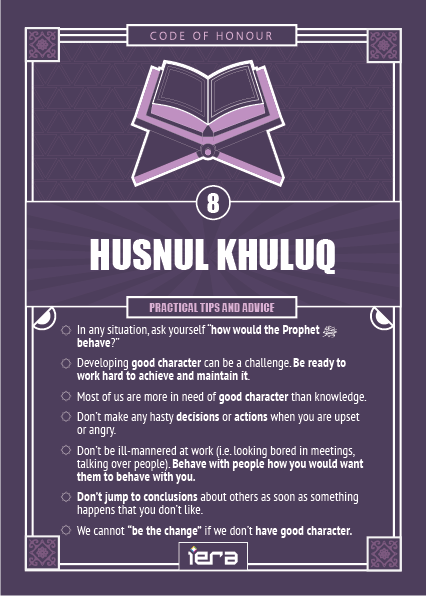
Mirror the Prophet’s Behavior: A Guiding Light
In every situation, ask yourself, “How would the Prophet behave?” Emulating the exemplary character of the Prophet Muhammad (PBUH) provides a compass for ethical conduct and guides us toward interactions steeped in kindness, patience, and compassion.
Character Development: A Continuous Endeavor
Developing good character can be a challenge, requiring consistent effort and self-reflection. Be ready to work hard to achieve and maintain it. Remember that noble character is a journey, not a destination, and your commitment to this path can yield profound personal growth.
Character vs. Knowledge: Prioritizing Ethical Virtues
While knowledge is undeniably valuable, the essence of good character often outweighs its significance. Noble character is a testament to your integrity, respect for others, and the values you hold. In many situations, people are more in need of good character than knowledge.
Emotional Equilibrium: Temperance in Actions
In moments of anger or frustration, refrain from making hasty decisions or taking impulsive actions. Practicing emotional restraint demonstrates your commitment to Husnul Khuluq. Maintain composure, and let wisdom guide your responses.
Professional Courtesy: Mannerisms in the Workplace
Extend Husnul Khuluq to your workplace by embodying professionalism. Avoid behaviors that reflect ill-mannered conduct, such as appearing disinterested in meetings or talking over others. Treat colleagues with the respect and consideration that you would want in return.
Avoid Snap Judgments: A Path to Understanding
In the face of events that displease you, refrain from jumping to conclusions about others. Husnul Khuluq encourages patience, empathy, and a willingness to understand the perspectives of those involved. This approach fosters harmony and resolution.
Be the Change: Through Noble Character
To “be the change” is to exemplify Husnul Khuluq in every aspect of your life. Your character defines your impact on the world. By nurturing a noble disposition, you inspire others to follow suit, contributing to a more compassionate and harmonious society.
‘Husnul Khuluq’ is not just a moral code; it’s a transformative force that shapes relationships, communities, and societies. At iERA, we understand the profound impact of good character on the world. Let ‘Husnul Khuluq’ be your guiding principle, guiding your actions and interactions. As you cultivate beautiful character within yourself, you inspire others to do the same.
‘Husnul Khuluq’ is not a mere principle but a way of life—a commitment to embodying the best of human qualities.

